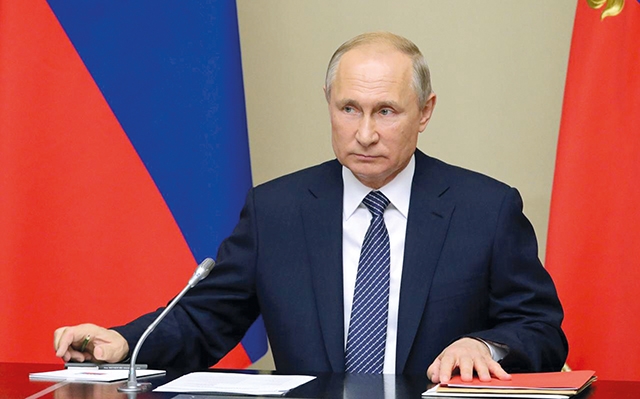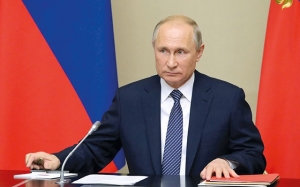On Putin's Plans for Maintaining His Leadership
Op-Ed
The annual address by Vladimir Putin to the Federal Assembly of January 15, 2020 became a kind of precondition to launching the political operation “Successor”, prepared by him. Although this address is usually made in the second or third month of the year, the change of date to early January is already quite an interesting point to note.
The pathos of his speech was conceived by his speechwriters and Kremlin spin doctors to include the so-called "Revolutionary Manifesto", which was preceded in early January by a very interesting meeting with the head of the Federal Control Chamber and former Minister of Finance, and one of the leaders of the "liberal" clan (the leadership of which includes: Dmitry Medvedev, Boris Fedorov, Anatoly Chubais, and Alexander Kudrin). During the meeting, which was widely covered by Kremlin-controlled media outlets (ОРТ, РТР, НТВ, РЕН-ТВ, etc.), some rather bold facts were stated to highlight the economic crisis in Russia, namely the scale of unprecedented corruption schemes in Russia (as a result of corruption in Russia over several years, the country lost 3 trillion RUB, not to mention that scandalous case of MIA Colonel Dmitry Zakharchenko, who misappropriated 10 billion RUB). This was preconditioned by a sociological survey conducted by Levada Center, in which, the President Putin's rating was the lowest - 38%, which is already a critical point, especially in light of Putin's political rebranding planned for 2024, which included launching a political “successor”.
That is why, against the background of such a radical and unexpected federal address, Putin started prematurely, or rather, he had to take these steps when he was in the political force majeure situation created in late 2010, in the wake of the “Bolotnaya events”, when he had to return to power again in the status of the first person and not a “gray eminence”. Such a force-majeure situation has now been created so as to result in the dismissal of Dmitry Medvedev's government, the man himself having already resigned, and the nomination of a representative of the "liberal" clan - the head of the Federal Tax Service Mikhail Mishustin, who is a pure “technocrat” and Alexander Kudrin’s trusted person. In fact, he reinforced the “liberal”clan in the Kremlin hierarchy when he appointed Dmitry Medvedev as deputy chairman of the National Security Council and tasked him with coordinating the defense policy and by doing so gave the wall to another influential clan of the “Siloviki” (Patrushev, Sechin, Ivanov) and further strengthened his own “President's pool” (Rothenberg, Kovalchuks, Prigozhin, Zolotov).
At the same time, he also reinforced the third influential clan, namely the “technocrats” (Volodin, Matvienko, Zhirinovsky, Vorobyov, Zorkin), when he issued the decree to drastically increase the powers of the legislative branch and the judiciary (especially the constitutional court) at the expense of the executive (especially presidential) powers (for example, the dismissal of judges by the State Duma, on the suggestion of the country's president: if he lost popularity, Putin actually proposed the same model to the parliament that he implemented based on the dismissal of governors). At the same time, under Putin's initiative, the powers of regional leaders, governors, including in the format of the foreign and defense policy, will increase. In his address, the outlines of the 2024 scenario have already been highlighted. In particular, the important informal political institute created by Putin himself, the State Council, which brings together federal and regional leadership and led directly by Putin himself, will soon become a constitutional body that will allow Putin to assume the functions of the Russian “Elbasy”, that is, the status quo functions of the national leader. The status of “Elbasy” was used in the case of former Kazakh President Nursultan Nazarbayev, who simultaneously became the Chairman of the National Security Council and the State Council and the holder of the status of national leader - Elbasy.
In fact, the presidency of the State Council will allow Vladimir Putin to assume the same function in the Russian Federation after 2024, as well as to become the chairman of a federal body - the National Security Council, which also appears to have received a special constitutional status. Appointing Dmitry Medvedev its deputy chairman did not happen accidentally, and it is likely that the Putin-Medvedev tandem will continue to be in place after 2024 and will receive informal de facto and de jure governance status.
Vladimir Putin's federal address increased the position of regional leaders, governors, and included them in the federal hierarchy, i.e., in the government "vertical", as a result of constitutional reforms, the new “technocrat” Prime Minister, Mikhail Mishustin, would not be able to become the next President in 2024 and the bet will be placed on the members of Putin’s private pool, namely Victor Zolotov, who is currently director of the most powerful special service, the National Guard troops and Ramzan Kadyrov's immediate commander, and a permanent member of the Security Council. The henchman of Army General Viktor Zolotov, the army being the most powerful special service, comprising 420,000 military personnel and all types of troops, except the Special Forces and Internal Troops, is currently the governor of Tula Region and the "hero of Crimea", retired Lieutenant General, Alexander Demin. Yuri Gavrilov, a well-known lawmaker in Georgia, was a direct business partner of Demin. It is likely that by 2024 Putin will put Demin at the federal level as soon as the government of “technocrat” Mishustin is able to pull the country out of its crisis. In general, it is interesting to note what was highlighted by Vladimir Putin in his address to the Federal Assembly:
o The President remains the head of law enforcement agencies and the direct head of the defense policy, but should agree with the Senate, the federal council, the resignation of law enforcement officials;
o The State Duma proposes the Prime Minister's candidacy to the President and the President is prohibited from rejecting him/her or his/her deputies and ministerial candidates;
o The constitutional rule is that the minimum wage should not be less than the minimum living standard;
o Increasing the powers of self-government bodies is about local self-government, not regional governance;
o The presidential candidate should not have dual citizenship and must have lived in the country for a minimum of 25 years;
o This will also apply to all types of political and state officials (MPs, ministers, etc.);
o The economic development of the country would shift to the principles of digital economy;
o Increasing the authority of the state to protect the rights of its citizens outside the country, as well as protecting the economy from foreign intervention;
o Strengthening the country's defense capability, promoting the creation of new military technologies and strengthening global hegemonic positions;
o Increasing family and maternal social status and special financial incentives (providing appropriate financial incentives to promote childbirth).
Generally, based on the foregoing, it is interesting what Vladimir Putin wanted to say and what political messages he voiced that will be of interest in the near future. In this regard, it is worth noting the following messages:
o Putin maintains a balance of power in the government “vertical” and, by using the principle of equilibrium, he strengthens the relevant clan over time under certain conditions;
o Putin does not intend to leave politics, even after 2024, or to give up power (his thesis: “Only the weak give up power”);
o Putin has already launched operation “Successor”;
o Putin is not going to violate the constitution and is going to resign as President in 2024, but will move to another, more powerful position: national leader (likely for a long time);
o Putin will strengthen the country's military expansionist policy.
By Dr Vakhtang Maisaia












